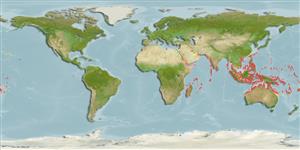>
Eupercaria/misc (Various families in series Eupercaria) >
Haemulidae (Grunts) > Plectorhinchinae
Etymology: Plectorhinchus: Greek, plektos = plaited + Greek, rhyngchos = snout (Ref. 45335).
More on author: Linnaeus.
Environment: milieu / climate zone / depth range / distribution range
экология
морской ассоциированный с рифами; пределы глубины 2 - 25 m (Ref. 37816). Tropical; 30°N - 27°S, 32°E - 167°W
Indo-West Pacific: East Africa (Ref. 33390) to western Indian Ocean to Papua New Guinea and New Caledonia.
Size / Вес / Возраст
Maturity: Lm ? range ? - ? cm
Max length : 72.0 cm SL самец/пол неопределен; (Ref. 37816)
колючие лучи спинного плавника (общее число) : 12 - 14; членистые (мягкие) лучи спинного плавника (общее число) : 17 - 20; колючие лучи анального плавника: 3; членистые (мягкие) лучи анального плавника: 7 - 8. This species is distinguished by the following characters: chin with 6 pores, no median pit; gill rakers on first gill arch 9-11 + 1 + 20-23 = 29-34; Dorsal fin with XII-XIV (usually XIII),17-20 with 3rd or 4th spines longest; lips fleshy, greatly swollen with age; scales ctenoid (rough to touch); lateral line tubed scales about 55-65; body depth 2.6-2.9 in SL; caudal fin rounded in juveniles, truncate in adults. Colour: juveniles with connected black blotches and spots that gradually break up into horizontal stripes; pectoral fins black in juveniles becoming uniform yellow in adults; tail spotted with age; adults with 6 to 12 broad dark brown, blue-brown or black stripes that persist on the belly and join horizontally across the nape and snout with anterior part of pale interspaces yellow forming 2 bright yellow stripes across interorbital and 2 around snout; eye usually yellow; fins yellow with black margins to vertical fins and black spots, pectoral fins uniform yellow with red-brown, chocolate, or blackish base, pelvic fins yellow with base red-brown, scarlet, or dark brown (Ref. 47695, 90102).
Inhabits coral reefs and inshore rocky reefs (Ref. 30573). Juveniles solitary, inhabits clear shallow protected lagoon; adults may be solitary or occur in aggregations (Ref. 37816). by handline and spear. Marketed fresh, a small quantity is salted (Ref. 47695).
Life cycle and mating behavior
Maturities | размножение | Spawnings | Egg(s) | Fecundities | личинки
Oviparous, distinct pairing during breeding (Ref. 205).
Randall, J.E. and C. Anderson, 1993. Annotated checklist of the epipelagic and shore fishes of the Maldives Islands. Ichthyol. Bull. of the J.L.B. Smith Inst. of Ichthyol. (59):1-47. (Ref. 11303)
Статус Красного Списка МСОП (Ref. 130435)
Угроза для людей
Harmless
Использование человеком
рыболовство: коммерческий
дополнительная информация
инструменты
Специальные отчеты
Скачать в формате XML
ресурсы в Интернет
Estimates based on models
Preferred temperature (Ref.
123201): 26.1 - 29.3, mean 28.5 °C (based on 2234 cells).
Phylogenetic diversity index (Ref.
82804): PD
50 = 0.5000 [Uniqueness, from 0.5 = low to 2.0 = high].
Bayesian length-weight: a=0.01380 (0.00670 - 0.02842), b=3.00 (2.83 - 3.17), in cm total length, based on LWR estimates for this Genus-body shape (Ref.
93245).
Trophic level (Ref.
69278): 3.9 ±0.6 se; based on size and trophs of closest relatives
устойчивость к внешним воздействиям (Ref.
120179): низкий, минимальное время удвоения популяции 4.5-14 лет (Preliminary K or Fecundity.).
Fishing Vulnerability (Ref.
59153): High vulnerability (55 of 100).
Nutrients (Ref.
124155): Calcium = 26.6 [10.3, 49.4] mg/100g; Iron = 0.473 [0.248, 0.897] mg/100g; Protein = 19.4 [17.5, 21.2] %; Omega3 = 0.111 [0.061, 0.186] g/100g; Selenium = 31.9 [18.0, 54.3] μg/100g; VitaminA = 70.3 [26.5, 183.9] μg/100g; Zinc = 1.05 [0.74, 1.52] mg/100g (wet weight);
